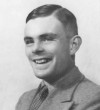
The Plot
As a child, Alan Turing gave little indication that he was likely to amount to anything. But as a young man at Cambridge, he soon revealed his mathematical abilities and his original way of envisioning problems. During World War 2 he contributed in a highly significant way to the British and American efforts to break the encrypted German military communications. And after World War 2 his vision of computers — and computer programs — proved incredibly prescient.
My Thoughts
Most people who know of Alan Turing at all know of him in relation to two things: first, for anyone who’s studied computer science, are the Turing machine (a theoretical model which Turing first posited and which can be used to describe computer algorithms) and the Turing test, a method for determining whether machines had demonstrated the ability to ‘think’; and second, for his work on breaking the Enigma machine during WWII.
But how many people know he was a world-class distance runner who, but for an injury, might have been able to compete at the Olympics? Or that he actually spent much of his last few years attempting to come up with a mathematical description of how and why organisms attain the structures they do? As with any scientist who has become known for a law or a particular experiment, the less famous details of his life often fall by the wayside.
Author Andrew Hodges does a spectacular job here filling in the blanks of Turing’s life. Not only does he dig up details from the extremely thin written record, but he spent copious amounts of time interviewing the people who knew Turing, gathering little details and anecdotes which really flesh Turing out as a person. It’s this part which I find entirely fascinating, as for the most part the people whose biographies I tend to read are so very long dead that such interviews are completely impossible. And, of course, at this point Turing is very nearly such a person himself — but this isn’t a new book, and at the time Hodges was doing his research, a mere 25 years or so had passed since Turing’s death. So plenty of people were still around to talk about him.
In addition to the life details, Hodges also doesn’t shy away from the mathematics, of which there is quite a bit in this book. Enough that I nearly felt like I was going to have to haul out my old college textbooks just to refresh myself on a few things. In the end I did not, because most people probably wouldn’t; neither did I spend a huge amount of time puzzling over the detailed description of how, precisely, the Enigma machine was broken. It was sufficient that I got the gist of it, and knew that I could go back if I needed specifics.
In all honesty, the central portion — Turing’s time at Bletchley Park doing his Enigma-related work — was the slowest of the book due to the amount of mathematical and mechanical detail included. The inclusion of this material contributes materially to how definitive this biography can be, but I’m not going to lie: it was a hard slog to get through. The pre and post-war sections were much more well balanced and thus considerably easier to read.
Hodges, a gay activist as well as a mathematician, doesn’t shy away from Turing’s tricky personal life any more than he does the tricky math. Turing had the misfortune to be homosexual during a period of panic in the government (both in Britain and the US) over the potential for such people to be compromised or blackmailed by the communists. (That their own laws and intolerances are what made the blackmail possible was an irony appreciated only by some.) He also had the misfortune to be a man who was unwilling or unable to conceal his nature by deceit. In fact, some of Hodges descriptions of his eccentricities probably lead the modern reader to wonder if he was somewhere on the autism spectrum. But whatever the reason, Turing did not hide his homosexuality well, and it became a source of trouble for him.
Hodges presents Turing’s death with all of the facts he could gather; he concludes it probably was a suicide, but the evidence either way seemed pretty thin to me. Still, one must acknowledge the fact that the ambiguity might have been deliberate, to give his mother peace of mind.
In Short
It’s unlikely that another biography of Alan Turing will or could come forward to supersede this one as definitive: Hodges has done his work well, and over the past 30 years has continued to collect supporting material (he speaks of publishing an expanded e-book edition on his website) to supplement the already exhaustive research which went into this volume. Turing’s life, his contributions to cryptography and computer science, are all covered in great detail.


A very nice review! I’m not sure I’m up to the challenge of reading this one myself, but it sounds like Hodges’ work sets the standard for good biography.
Yeah, I really was very impressed by the level of detail he managed to extract, given his own admission that there was hardly anything actually written down.
I also wondered about the autism spectrum or OCD. Of course the book I read isn’t as detailed as this one, so I only had a couple of things to go on. He said at one point that he couldn’t get off a bike until he fell off. But of course kids play those kind of mental games with themselves. (Heck, even non-OCD adults do. Especially when gambling.)
I also also wondered about the suicide. Maybe because I just finished reading a mystery, but it seems like superficial evidence to me. But again, my book didn’t go into too many details.
You picked the right book to read. And I’m just glad I didn’t have to read it. :)